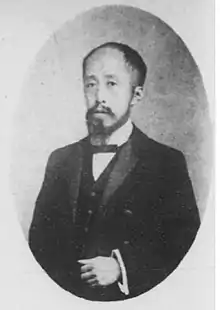Shen Junru | |
|---|---|
| 沈钧儒 | |
 | |
| 1st Chief Justice and President of the Supreme People's Court | |
| In office 1 October 1949 – 22 September 1954 | |
| Succeeded by | Dong Biwu |
| Vice Chairman of the Standing Committee of the National People's Congress | |
| In office 15 September 1954 – 11 June 1963 | |
| Chairman | Liu Shaoqi Zhu De |
| Vice Chairman of the Chinese People's Political Consultative Conference | |
| In office 21 September 1949 – 11 June 1963 | |
| Chairman | Mao Zedong Zhou Enlai |
| Chairman of the China Democratic League | |
| In office 10 February 1955 – 11 June 1963 | |
| Preceded by | Zhang Lan |
| Succeeded by | Yang Mingxuan |
| Personal details | |
| Born | 2 January 1875 Suzhou, Jiangsu |
| Died | June 11, 1963 (aged 88) |
| Political party | China Democratic League |
| Alma mater | Hosei University |
Shen Junru (Chinese: 沈钧儒; pinyin: Shěn Jūnrú; Wade–Giles: Shen Chünju; January 2, 1875 – June 11, 1963) was a Chinese lawyer and politician who was the president of the Supreme People's Court of the Central People's Government of the People's Republic of China. He was also the chairman of the China Democratic League.
Biography
Shen was born in Suzhou, with family ancestry in Jiaxing City. He received the Jinshi or "presented scholar" degree, the highest under the imperial examination system. Shen completed a preparation course (速成科) at Hosei University, in Tokyo, Japan in 1905.
Shen Junru and other six intellectuals in Shanghai were arrested in 1936 by Chiang Kai-shek's government, which is known as the Seven Gentlemen Incident. This incident caused a national crisis and the seven individuals were released only after Japan launched an invasion in the summer of 1937.[1]
Shen attended the first Chinese People's Political Consultative Conference (CPPCC) in 1949 and was appointed to be the first President of the Supreme People's Court from 1949 to 1954. Shen had also served as a member of the committee of the Central People's Government, and was vice-chairman of the CPPCC National Committee from 1949 to 1963.
Additionally, Shen was vice-chairman of the Standing Committee of the National People's Congress from 1954 to 1963, and chairman of the China Democratic League from 1956 to 1963. He was also vice-chairman of the Chinese Political and Law Studies Association (中国政治法律学会).
Notes
References
- ↑ Patrick Fuliang Shan, “Demythologizing Politicized Myths: A New Interpretation of the Seven Gentlemen Incident,” Frontiers of History in China, (Vol. 8, No. 1, 2013), 51-77.